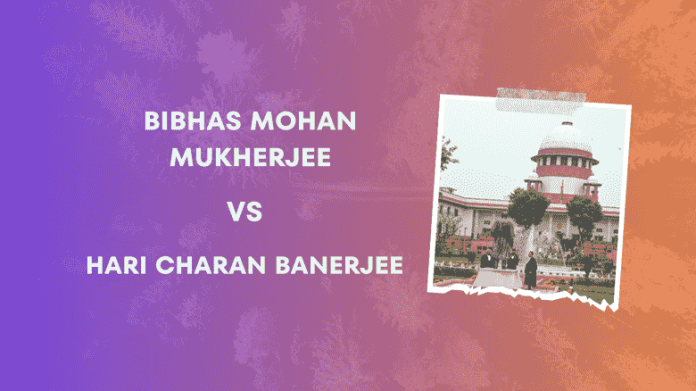Bibhas Mohan Mukherjee And Ors. vs Hari Charan Banerjee,1960
- Petitioner/Appellant: Bibhas Mohan Mukherjee
- Respondent: Hari Charan Banerjee
Facts of the Case
The dispute arose following the death of the testator, whose will was contested by Bihas Mukherjee. Hari Banerjee, the executor and principal beneficiary under the will, claimed the will was executed according to the testator’s wishes. Bihas Mukherjee, however, argued that the will was a result of undue influence and coercion, questioning the testator’s mental capacity at the time of its execution.
The case was primarily adjudicated under the following laws:
- Indian Succession Act, 1925: Governing the distribution of property through testamentary succession.
- Evidence Act, 1872: Establishing the standards for admissible evidence, including the requirements for proving a will’s validity and the mental capacity of the testator.
Issues Addressed by the Court
- Validity of the Will:
- The court examined whether the will met all legal requirements, including the presence of two attesting witnesses and the testator’s signature.
- The authenticity of the document was scrutinized by comparing it with other known signatures of the testator.
- Mental Capacity of the Testator:
- Evaluated medical records and expert testimonies to determine if the testator was of sound mind.
- Considered whether the testator understood the nature and consequences of the will at the time of its execution.
- Allegations of Undue Influence and Coercion:
- Investigated the relationship between the testator and Hari Banerjee, looking for any signs of manipulation or pressure.
- Assessed the credibility of witnesses who testified about the interactions between the testator and Hari Banerjee.
- Rights of Legal Heirs:
- Analyzed the provisions of the Indian Succession Act to determine the rights of the legal heirs.
- Evaluated any prior wills or codicils that might affect the distribution of the estate.
Evidence Presented
By the Plaintiff (Bihas Mukherjee):
- Testimonies from relatives and friends suggest that the testator was not of sound mind.
- Evidence indicates that Hari Banerjee had a dominant position over the testator.
- Documents and expert opinions question the authenticity of the will.
By the Defendant (Hari Banerjee):
- Testimonies from witnesses who attested the will, confirming its execution as per legal requirements.
- Medical records and expert opinions affirming the testator’s mental capacity.
- Evidence showing the testator’s consistent intention to bequeath the property to Hari Banerjee.
Court’s Findings
- Execution and Validity of the Will:
- The court found that the will was executed with all formal requirements fulfilled. The attesting witnesses were credible, and there were no discrepancies in their testimonies.
- Mental Capacity:
- Based on medical records and expert testimonies, the court concluded that the testator was of sound mind and fully understood the implications of the will.
- Undue Influence:
- The court did not find sufficient evidence to prove that Hari Banerjee exerted undue influence or coercion over the testator. The relationship between them was deemed normal without signs of manipulation.
- Legal Heirship:
- The court upheld the provisions of the will, affirming Hari Banerjee as the rightful beneficiary. It also ensured that any legal heirs not mentioned in the will had their rights reviewed under the Indian Succession Act.
Judgment on Bibhas Mohan Mukherjee And Ors. vs Hari Charan Banerjee ,1960
The court ruled in favor of Hari Banerjee, validating the will and dismissing the claims of Bihas Mukherjee. The judgment emphasized:
- Confirmation of Will’s Validity: The will was deemed valid and legally binding, executed according to the testator’s wishes.
- Property Distribution: The property was to be distributed as per the will, recognizing Hari Banerjee as the primary beneficiary.
- Legal Costs: Bihas Mukherjee was ordered to bear the legal costs incurred by Hari Banerjee.
Significance of the Judgment
The judgment in Bibhas Mohan Mukherjee And Ors. vs Hari Charan Banerjee And Ors. on 2 August 1960 is significant for several reasons:
- Clarification of Testamentary Succession Laws: It provides clarity on the standards for validating a will and assessing the mental capacity of a testator.
- Precedent for Future Cases: The case serves as a precedent for future disputes involving testamentary documents, especially concerning allegations of undue influence and coercion.
- Protection of Testator’s Intentions: The ruling reinforces the principle that the testator’s genuine intentions, as expressed in a valid will, should be upheld by the courts.
Conclusion
The High Court of Calcutta’s decision in Bibhas Mohan Mukherjee And Ors. vs Hari Charan Banerjee And Ors. on 2 August 1960 underscores the judiciary’s role in safeguarding the principles of testamentary succession. It highlights the rigorous standards required for the validation of wills and the protection of rightful beneficiaries against unfounded allegations of undue influence. This case reaffirms the importance of clear, unequivocal evidence in adjudicating disputes over testamentary documents and ensures the testator’s wishes are respected.
Also Read:
Rights of undertrial prisoners in India
How To Send A Legal Notice In India

